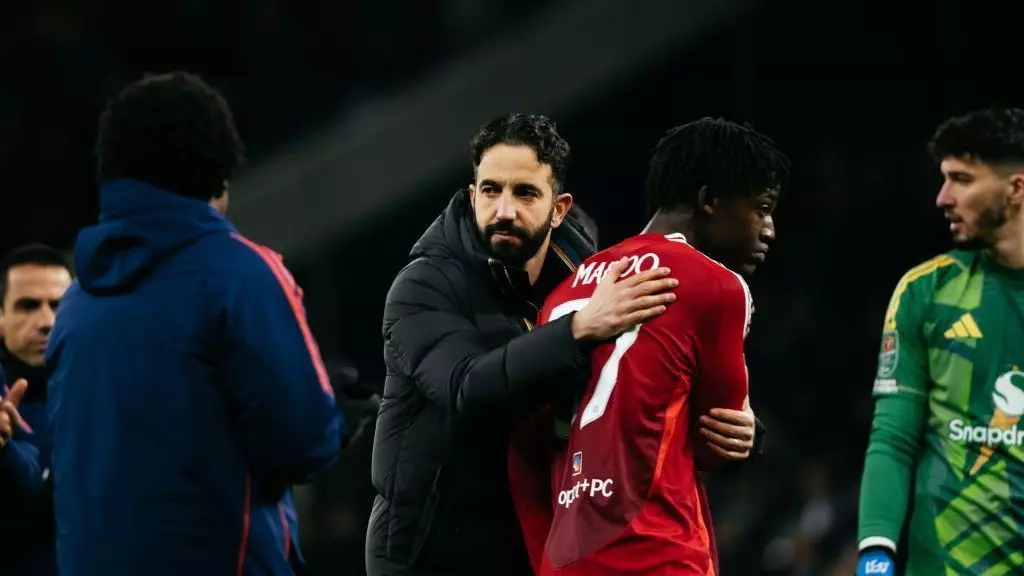In the world of football, decisions made by managers can reverberate through the entire squad, influencing not only the outcomes of matches but also the morale and dynamics within the team. Recently, Ruben Amorim, the head coach of Manchester United, faced intense scrutiny following his decision to drop star player Marcus Rashford from the squad for two consecutive games, culminating in a quarterfinal exit from the Carabao Cup after a thrilling 4-3 loss to Tottenham Hotspur. This article delves into the ramifications of such choices for both the manager and the player, examining the broader context of team dynamics, individual player performance, and the implications for United’s season.
Cup competitions like the Carabao Cup represent high-stakes scenarios for clubs, where the pressure of performing can make or break a season. Following a tough derby win against Manchester City, expectations were sky-high for United as they faced Tottenham in the quarterfinals. However, Amorim’s decision to exclude Rashford raised eyebrows and led to a ripple effect that analyzed the rationale behind such a bold move. In a sport where individual talent often shines through, dropping a player of Rashford’s caliber necessitates a thorough understanding of not just tactical decisions, but also the subtler implications of team morale and cohesion.
Ruben Amorim defended his decision vehemently, arguing that it was for the greater good of the team. Claiming that he is committed to making choices that benefit the collective rather than any individual, he emphasized his belief that such decisions are always in line with his vision for the squad. This perspective raises the question: Are there moments when the needs of the team overtly overshadow individual contributions, especially when those contributions could have provided crucial scoring opportunities? Amorim’s rationale interpreted through a critical lens suggests a balancing act between personal managerial philosophy and the unpredictable nature of team sports.
Interestingly, while the absence of Rashford initially appeared detrimental, particularly as United fell to a three-goal deficit, the team displayed resilience, clawing back to a respectable 3-2 before ultimately succumbing to Tottenham. This sequence offers insights into the team’s capability to adapt, but it also highlights the precariousness of relying on tactical exclusion of key players. The immediate aftermath showcases how the dynamics within the locker room can be volatile, particularly when high-profile decisions lead to unexpected outcomes, such as the team spiraling into a losing position.
Amid the debate surrounding Amorim’s controversial decision, it is essential to note the significant roles played by both goalkeepers during the match. United’s Altay Bayindir was entrusted with a starting position yet faltered under pressure, contributing to the goals conceded. On the other side, Spurs’ keeper Fraser Forster made critical mistakes that were comparatively more glaring. This duality presents an intriguing subplot; while Amorim’s choices were scrutinized, the performances of lesser-discussed players like the goalkeepers played a pivotal role in the match’s outcome.
The nature of blame in team sports often highlights just how quickly a single poor performance can overshadow other strategic decisions. As Forster faced backlash from his own management despite prior commendations, so too do coaches grapple with the repercussions of a single match on a general season’s trajectory.
The aftermath of United’s Carabao Cup exit raises seminal questions about Amorim’s leadership and the overarching unity within the team. With conversations about Rashford’s potential desire to leave, one must ponder the impact such a critical decision has on team spirit and individual player resolve. As the squad looks ahead to upcoming fixtures, including a semifinal clash against Liverpool, the pressing need for a cohesive unit has never been greater.
Ultimately, Amorim’s management style and selection criteria will undergo relentless scrutiny as they navigate the complexities of both cup and league campaigns. The coming weeks will prove whether his choices forge a resilient force or if they catalyze fractures within the squad—because football is not just about talent; it’s equally about unity and collective ambition.


Leave a Reply